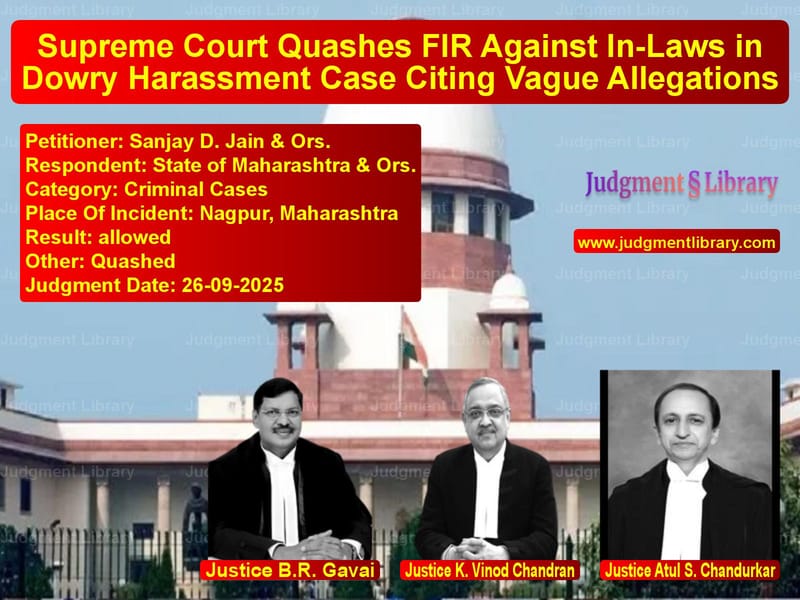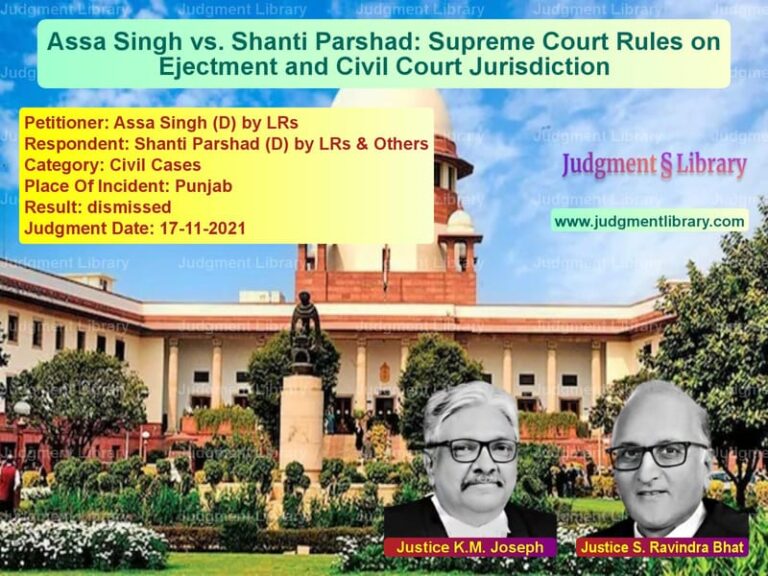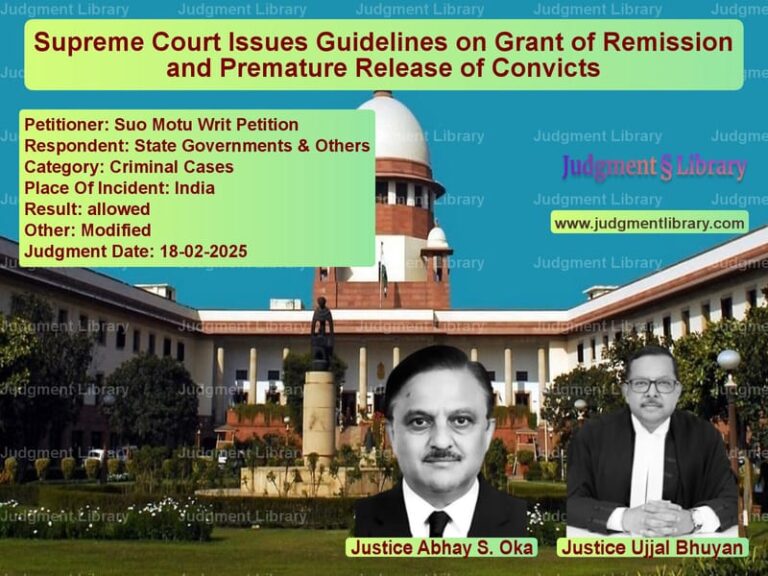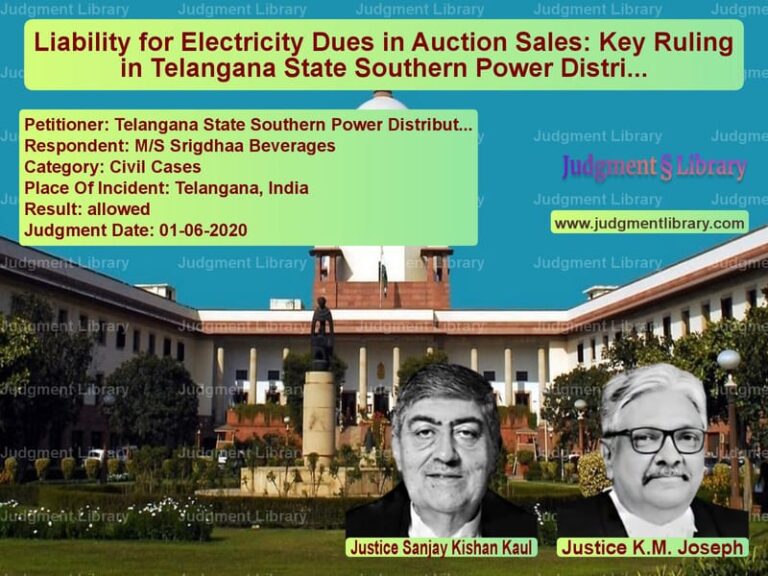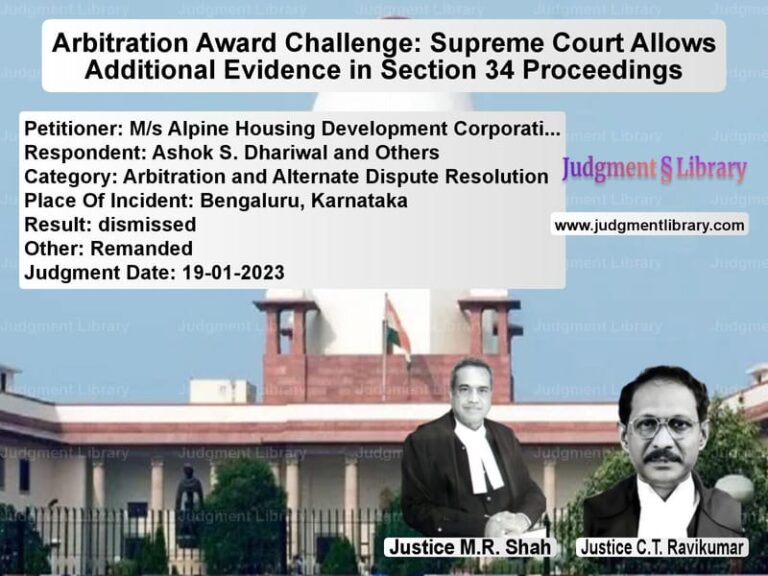Supreme Court Quashes FIR Against In-Laws in Dowry Harassment Case Citing Vague Allegations
In a significant ruling that reinforces the legal standards for quashing criminal proceedings, the Supreme Court of India has set aside an FIR filed against the in-laws of a married woman in a dowry harassment case. The judgment, delivered by a bench comprising Chief Justice B.R. Gavai, Justice K. Vinod Chandran, and Justice Atul S. Chandurkar, provides crucial guidance on what constitutes valid allegations under Section 498-A of the Indian Penal Code and when courts should exercise their power to quash criminal proceedings to prevent abuse of legal process.
The case involved Sanjay D. Jain and his family members who were accused by their daughter-in-law of demanding dowry and subjecting her to cruelty. The marriage between the complainant and Piyush, the son of appellants, took place on July 14, 2021. According to the complainant, her family had given various gifts during the marriage ceremony, but the demands for additional gifts continued even after the wedding. The situation escalated to the point where on February 6, 2022, an FIR was registered at Bajaj Nagar Police Station in Nagpur under Sections 498-A, 377, and 506 read with Section 34 of the Indian Penal Code.
The appellants, who are the father-in-law, mother-in-law, and sister-in-law of the complainant, approached the High Court seeking quashing of the FIR under Section 482 of the Code of Criminal Procedure. However, the High Court dismissed their application, finding that there was prima facie material to proceed with the trial. This led to the appeal before the Supreme Court.
During the proceedings before the Supreme Court, Mr. Kartik Shukul and Mr. Anurag Gharote, learned Advocates for the appellants, presented compelling arguments. They submitted that “on a complete reading of the FIR, it was clear that no offence under Sections 498-A, 377 and 506 read with Section 34 of the Penal Code had been made out against the appellants. The ingredients necessary for invoking the said provisions were absent in the FIR and hence, no offence could have been registered against the appellants. The allegations as made were entirely vague in nature and in the absence of any details whatsoever it could not be said that even a prima facie case had been made out for proceeding with the trial.”
The appellants’ counsel further argued that “as regards the registration of offence punishable under Sections 377 and 506 of the Penal Code are concerned, it was submitted that no allegations whatsoever in that regard had been made against the appellants. This was clear from a complete reading of the FIR. Notwithstanding this position, the High Court erred in not quashing the proceedings even as regards Sections 377 and 506 of the Penal Code. It was, thus, submitted that continuation of the criminal proceedings against the appellants would amount to an abuse of the process of law and, therefore, the same ought to be quashed insofar as the appellants were concerned.”
On the other side, Mr. Adarsh Dubey, learned Advocate appearing for the State of Maharashtra, and Mr. Sachin Patil, learned Advocate appearing for the complainant, defended the High Court’s decision. They submitted that “at this stage the Court ought to consider the complaint in its entirety. On the perusal of the entire complaint, it was clear that an offence under Section 498-A had been clearly made out against the appellants. The complainant had clearly stated that there was a consistent demand by the appellants for gifts and other items towards dowry from the complainant and her family. The items demanded had been mentioned in the complaint and other better particulars could be brought on record as evidence. Thus, taking an overall view of the matter and on perusing the complaint in its entirety, the High Court was justified in refusing to quash the proceedings in exercise of jurisdiction under Section 482 of the Code.”
The Supreme Court, after careful consideration of the arguments and examination of the FIR, delivered a judgment that clarified several important legal principles. The Court began by outlining the parameters for quashing FIRs, stating that “if the allegations made in the FIR or the complaint, even when taken at their face value and accepted in their entirety do not prima facie constitute any offence or make out any case against the accused, quashing of the proceedings would be justified. Vague and general allegations cannot lead to forming of a prima facie case.”
The Court provided crucial clarification on what constitutes cruelty under Section 498-A, explaining that “as regards the ingredients for making out an offence punishable under Section 498-A of the Penal Code is concerned, the requirement is that there has to be cruelty inflicted against the victim which either drives her to commit suicide or cause grave injury to herself or lead to such conduct that would cause grave injury or danger to life, limb or health. The latter part of the provision refers to harassment with a view to satisfy an unlawful demand for any property or valuable security raised by the husband or his relatives.”
In its analysis of the specific allegations in this case, the Court found that “a perusal of the FIR and its consideration in entirety indicates that statements of a general nature have been made therein as against the present appellants. The complainant states that on 07.08.2021 when she had gone to her parental house, she had received a call from her mother-in-law raising a demand for clothes and jewellery. When she returned to her matrimonial house on 30.08.2021, she had taken few clothes for the family members. Except this statement, all other statements are of a general nature as well as vague without any particulars. There are other omnibus statements made in the complaint without any particulars whatsoever.”
The Court made a significant observation about the nature of allegations required to sustain a case under Section 498-A, noting that “it is also to be noted that for the purpose of constituting an offence punishable under Section 498-A of the Penal Code, cruelty as indicated in the Explanation to the said provision must be stated to be inflicted. The cruelty caused by the husband and his family members should be of such nature that it is inflicted with the intention to cause grave injury or drive the victim to commit suicide or inflict grave injury to herself. Such allegations are absent in the present case. We do not find that on a complete reading of the complaint, a prima facie case for proceeding under Section 498-A of the Penal Code has been made out against the appellants.”
Regarding the other charges under Sections 377 and 506 of the IPC, the Court found that “as regards the offence punishable under Sections 377 and 506 read with Section 34 of the Penal Code is concerned, it is seen that the allegations in this regard have been made only against the complainant’s husband and not against the present appellants. The entire tenor of the complaint in that regard seeks to implicate the complainant’s husband and all incidents stated therein relate to him. There is no allegation whatsoever in that context against the appellants that would require them to face trial on that count.”
The Supreme Court concluded that “for the aforesaid reasons, we are satisfied that on the touchstone of the law laid down in State of Haryana and Others vs. Bhajan Lal and Others, a case has been made out by the appellants for quashing of the criminal proceedings lodged against them under Sections 498-A, 377 and 506 read with Section 34 of the Penal Code. Continuation of these proceedings would amount to an abuse of the process of law and, hence, the appellants are entitled to relief.”
This judgment serves as an important reminder that while the law provides protection to women against dowry harassment and cruelty, it cannot be used as a tool for harassment through vague and general allegations. The Supreme Court’s decision emphasizes the need for specific, particularized allegations that meet the legal requirements of the offenses charged.
The ruling also highlights the court’s role in preventing the misuse of legal provisions and protecting individuals from facing criminal trials based on insufficient evidence. By quashing the FIR against the in-laws while allowing the proceedings to continue against the husband, the Court has struck a balance between protecting women’s rights and preventing the misuse of anti-dowry laws.
This judgment is particularly significant in the context of ongoing debates about the potential misuse of Section 498-A and the need to ensure that genuine cases are distinguished from those based on vague and general allegations. The Supreme Court’s clear articulation of the legal standards for quashing proceedings provides valuable guidance to lower courts and helps maintain the integrity of the criminal justice system.
Petitioner Name: Sanjay D. Jain & Ors..Respondent Name: State of Maharashtra & Ors..Judgment By: Justice B.R. Gavai, Justice K. Vinod Chandran, Justice Atul S. Chandurkar.Place Of Incident: Nagpur, Maharashtra.Judgment Date: 26-09-2025.Result: allowed.
Don’t miss out on the full details! Download the complete judgment in PDF format below and gain valuable insights instantly!
Download Judgment: sanjay-d.-jain-&-ors-vs-state-of-maharashtra-supreme-court-of-india-judgment-dated-26-09-2025.pdf
Directly Download Judgment: Directly download this Judgment
See all petitions in Dowry Cases
See all petitions in Domestic Violence
See all petitions in Judgment by B R Gavai
See all petitions in Judgment by K. Vinod Chandran
See all petitions in Judgment by Atul S. Chandurkar
See all petitions in allowed
See all petitions in Quashed
See all petitions in supreme court of India judgments September 2025
See all petitions in 2025 judgments
See all posts in Criminal Cases Category
See all allowed petitions in Criminal Cases Category
See all Dismissed petitions in Criminal Cases Category
See all partially allowed petitions in Criminal Cases Category

